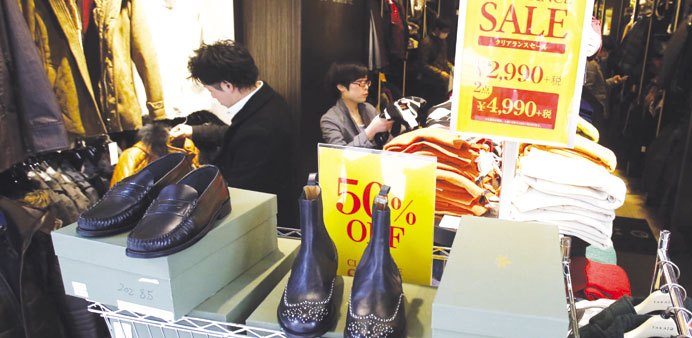People look at clothes at a retail store in Tokyo. Japan’s wholesale prices, which will be released on Wednesday, is expected to rise 0.5% in the year to February, following a 0.3% rise in January.
Reuters/Tokyo
Revised fourth quarter Japanese data on Monday is likely to show capital spending was slightly stronger than expected, but overall economic growth was little changed from initial estimates, confirming the economy only managed to limp out of recession.
Among other key data next week, core machinery orders probably fell in January for the first time in three months largely due to a reactionary pullback after a jump in December. Orders are an important indicator of capital spending in the coming six to nine months.
Firms’ spending on plant and equipment and an increase in wages hold the keys to the ultimate success of Prime Minister Shinzo Abe’s policy strategy to generate a virtuous demand cycle in the economy and end decades ofdeflation.
Corps have been cautious about spending as they are worried about the outlook for the economic recovery, but analysts project strong corporate earnings and lower oil prices will help their spending. “Capital spending will likely head to recovery, including the non-manufacturing sector, as consumer spending will probably improve, benefiting from lower oil prices this year,” said an analyst at SMBC Nikko Securities in the survey.
“Although data will likely show a lack of strength, it will probably confirm capex is bottoming out.”
Capital expenditure, one of the components of GDP, probably rose 0.3% for the quarter from a preliminary 0.1% gain, the poll showed. But the expected upward revision in the capex will not be strong enough to change the overall economic growth for the fourthquarter.
The poll found the economy expanded an annualised 2.2% in the quarter, unchanged from an initial estimate, which had been well below economists’ expectations. This would translate into a quarter-on-quarter increase of 0.6%. “There is probably no change in the overall economic picture that both domestic and external demand contributed to the growth, private spending is picking up and exports increased, led by IT-related goods,” said Hidenobu Tokuda, senior economist at Mizuho Research Institute.
The Cabinet Office will release the revised GDP data at 8:50 am on Monday (2350 GMT Sunday). On Wednesday, the Cabinet Office will also release core machinery orders, which probably fell 4.1% in January from the previous month, the survey showed, after having risen 8.3% in December, the fastest pace in six months. Compared with a year earlier, core orders are expected to have fallen 1%, according to the survey.
The current account balance, which is due on Monday, is seen to show a surplus of ¥288.2bn ($2.40bn) in January, thanks to income gains from overseas earnings inflated by a weak yen and shrink in trade deficit on falling oil prices. It would be the seventh straight monthly surplus.
Wholesale prices, which will be released on Wednesday, likely rose 0.5% in the year to February, the poll showed, following a 0.3% rise in January.

